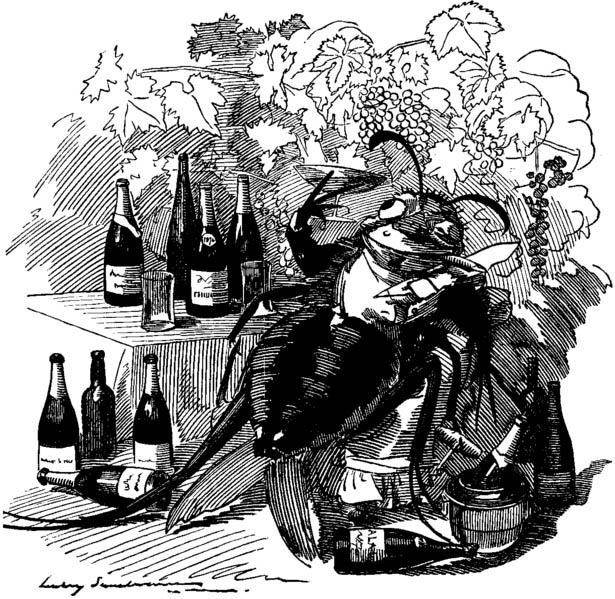LESSON
French attitudes towards alcohol evolving over time
Bob
Ponterio
SUNY Cortland
Background for the teacher (intended for college level classes)
 |
Alcohol, especially wine, has long been a basic component of French social life and a staple of the dinner table.
Alcohol abuse is a cause of many social problems and led to temperance and prohibition movements in France. However, these movements had perspectives that differed from similar movements in the US. Whereas in the US, prohibition covered all alcohol, in France, it was limited to absinthe. Why? |
Temperance (moderation) and prohibition (interdiction)
movements tended to be supported by religious and women's groups because excessive
consumption often led to loss of family income, abuse of women and children,
and other, shall we say, less than moral behavior.
In France, this period corresponds to two major events.
First, during the 19th century, there was a massive movement
of people out of the countryside and agricultural work and into the cities
for industrial work. Living conditions in cities were generally poor, salaries
were low, alcohol consumption tended to be a big part of the limited recreational
time available to the working classes.
Next, phylloxera, the insect that destroyed most French vineyards, was introduced from the US and began devastating the wine industry in France around 1863.
Absinthe
Absinthe had been an expensive drink, made from grape alcohol. Working class people tended to drink wine, which was less expensive. As wine disappeared and prices skyrocketed, companies began making absinthe with lower priced grain alcohol. Since the large working class began drinking this new lower cost absinthe, more companies began making it, and production standards fell, quite probably leading to the production of some absinthe made from bad alcohol.
Abuse of absinthe or abuse of alcohol?
Interest in the plight of the working class was seen in French art of the period, and alcohol/absinthe was prominent. Degas' Absinthe (1876) and Zola's L'Assommoir (1876-7) touched the popular imagination and had a major impact on attitudes (perspective) towards absinthe and alcohol abuse.



Organizations used public ad campaigns to influence popular opinion and increase support for temperance and prohibition.



And absinthe, because of its growing popularity and new association
with the working class, became a focus of the anti-alcohol movement. Bourgeois
fear of working class violence after 1848 also likely played a role in the
condemnation of a drink associated with "working class" behavior.

Indeed, many, especially in the slowly recovering wine industry,
felt the need to carefully distinguish between absinthe and other alcohol
products. So people could be for wine that made people feel "good"
but against absinthe that made people "crazy".


After absinthe was banned in France in 1915 (having already been banned in Switzerland earlier) the anti-prohibition movement criticized the ban as an affront to French freedoms at a time when the country was plunged into war.


In addition, absinthe was even portrayed as beneficial to
health. In these ads, the positive images represent the middle class.


Mais oui, ma chère! Il est de très bon ton aujourd'hui de prendre une "Oxygénée Cusenier," mon docteur me l'a dit.
 |
Wine was promoted as a cure for specific ailments. We might ask, though, was this intended to defend alcohol or was it also aimed against absinthe?
Who stood to gain the most from keeping absinthe illegal?
Wine producers!
|
 |
What a great context for practicing negation in French class!
Elle a bu de la bière.
Mais celle-là, elle n'a pas bu de bière! |
 |
And what about her?
A-t-elle bu de l'alcool? Mais bien sûr que non! Elle n'a rien bu. |
| And what about drinking and driving? Even train engineers who need to stay alert drink RICARD! |
 |
 |
Never take the wheel after a good meal without your
class of Cointreau!
A perspective diametrically opposed to today's views. |
 |
And when should you start?
Il n'y a pas d'âge!
"Comme Grand-père" |
 |
Today, public service campaigns intended to modify the French perspective about drinking alcohol continue to abound. Frank talk about sexuality allows messages to associate alcohol with unprotected sex.
And what about performance?
Tu t'es vu quand t'as bu? |
Boire ou conduire, il faut choisir. A campaign that continues today.


Une soirée sans capitaine de soirée c'est mortel!

Celui qui conduit, c'est celui qui ne boit pas !


http://www.rentrerenvie.fr/goodies.htm# (radio, video, posters)
 |
Trinquer sans capitaine de soirée, c'est aussi trinquer après. |
 |
Ne pas désigner de capitaine de soirée reste le plus sûr moyen de finir dans une boîte. |
Or using a post-it note (un pense-bête) to associate the ad with current cultural practices.


































